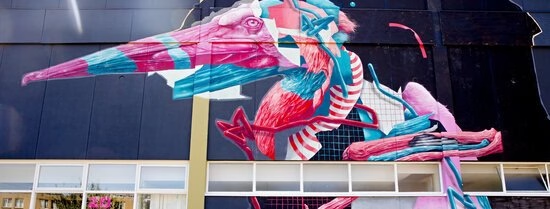How are the rapid developments in artificial intelligence affecting the work and job security of musicians? Yosha Wijngaarden, a researcher at the Erasmus School of History, Culture and Communication, studies the work practices of creative makers. She argues that changes in the creative industries give insights on broader developments in the labour market.
When Wijngaarden started her PhD more than a decade ago, “innovation” was the buzzword. “Everyone was talking about it. In my research I wanted to explore whether creative incubators or coworking spaces could foster innovation in the creative industries.” The answer turned out to be less straightforward. “Simply putting people together does not automatically lead to innovation,” she recalls. “And besides, what exactly is innovation, and how do you measure it? Opinions differ widely.”
Her dissertation therefore shifted focus to what she calls “work practices”. By this she means the way people organise their work, manage their time and collaborate. Her research showed that coworking spaces do not necessarily produce major creative breakthroughs, but that low-threshold support with practical questions can make a real difference. She experienced this herself when her own workplace moved to a more open layout. “At first there was a lot of resistance, but eventually almost everyone appreciated it. For me as an early-career researcher it was very helpful. I would pop in on a colleague more quickly, and those moments of informal contact turned out to be really valuable.”
Work practices and incomes in the music sector
This focus on work practices is central to her current research as well. In a recent project she and her colleagues studied the effect of a basic income on the working lives of artists. For six months participants received an allowance of around one thousand euros. What happened? “Many musicians gave up their side jobs and concentrated fully on their music. Not to relax more, but to produce more.” The word that kept recurring in the interviews was “breathing space”. “And they didn’t mean financial breathing space, but creative space. They felt they could finally do what they truly stand for. It led to focus, depth and work that felt closer to themselves.”
The times they are AI-changing
Today the buzzword is no longer innovation but AI. Much of the public debate revolves around whether AI will replace human work, a fear that Wijngaarden considers not entirely unfounded. Yet what interests her more is how new technology shapes the work practices of musicians. In her project The times they are AI-changing, set up in collaboration with Thunderboom Records, she examines AI tools that can improvise in real time with artists. “I want to know: how does such a collaboration between human and AI work in practice? When does it inspire, and when does it block creativity?”
This theme also includes a study of artists’ perceptions, conducted with Research Master’s student Zuzanna Macała. She uncovered a surprising pattern: younger musicians are often more critical of generative AI than their older peers. “We assumed that young makers who grew up with technology would be ahead. But they still attach great importance to creative autonomy. For them the creative process is sacred.” Older musicians, by contrast, turn out to be more pragmatic and more accustomed to making concessions, for instance to the wishes of a record label.
In the coming years Wijngaarden plans to investigate what the use of AI means in the long run for the careers and incomes of musicians. Together with colleagues and BAM! Popauteurs (the Dutch association of songwriters) she is working on a national survey that examines how artists from different genres and age groups deal with AI. “Creativity is central in the music industry, which makes it a fascinating sector
The music sector as a predictor
For Wijngaarden it is no coincidence that new developments first become visible in the music sector. “Musicians often work independently, with limited security and under the influence of technological innovation. Exactly the themes that are becoming increasingly dominant in other fields too. What happens there, you often see later in other professions. The sector is the canary in the coal mine.”
- Researcher

